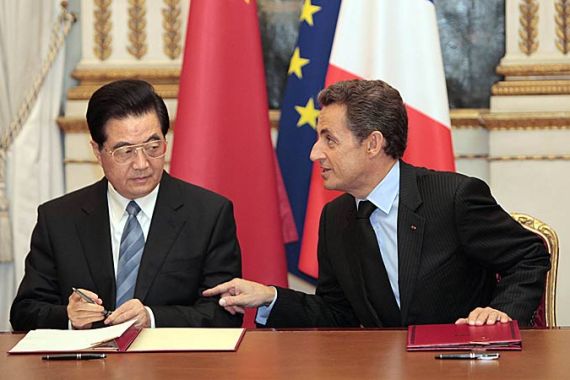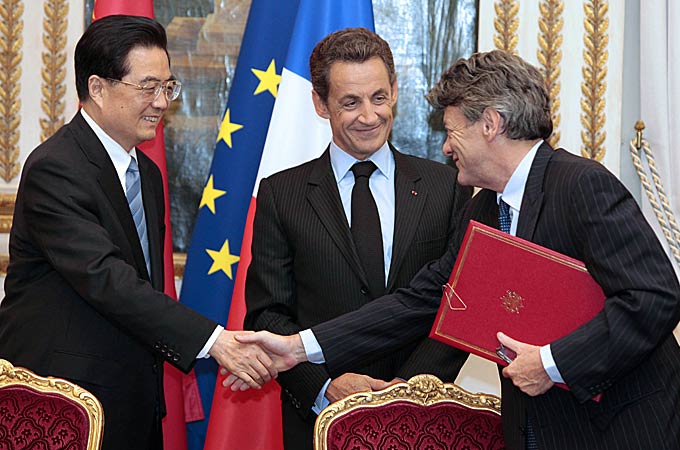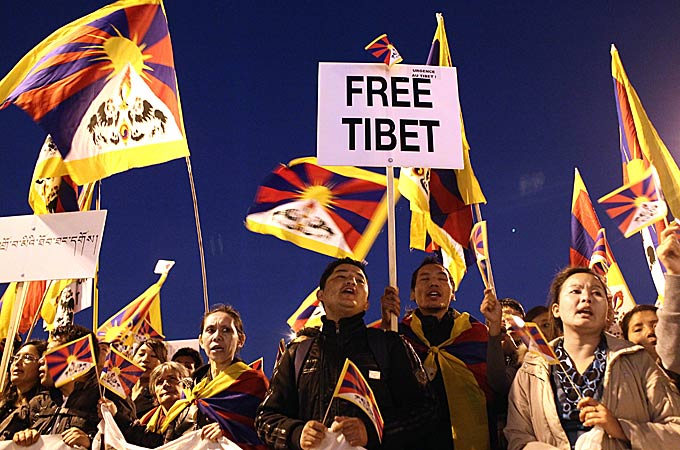France wins $20bn China contracts
Chinese president signs several deals, including for French aircraft and nuclear fuel, during state visit to Paris.

 |
| Sarkozy, centre, said China ‘should not be seen as a risk but an opportunity’ [AFP] |
Hu Jintao, the Chinese president, has signed multi-billion-dollar aircraft and nuclear fuel contracts with French companies during a state visit to Paris.
The contracts, which totalled $20bn, included an agreement to buy 102 Airbus jets and deals with Areva to build a nuclear-fuel treatment factory in China and supply uranium over 10 years.
Fu Ying, the Chinese deputy foreign minister, said Hu had also given his backing to France’s agenda for the G20 presidency, which the French government will take up in the new year.
She said Beijing would double its annual trade with France to $80bn over the next five years.
Hu’s three-day state visit to France, after which he travels to Portugal, comes at a time when EU leaders have closed ranks with Washington in urging China to allow its yuan currency to appreciate more quickly, unsettling relations between Beijing and Brussels.
China hopes the trip will ease those strains ahead of a G20 leaders summit in South Korea next week which will focus on global economic imbalances.
In turn, the government of Nicolas Sarkozy, the French president, wants to build common ground for its ambitious agenda of reforming the global monetary system, while avoiding alienating China by harping on about the yuan.
“Under the current international situation that is undergoing profound and complicated changes, China and France share broad common interests and huge potential for co-operation,” Hu said in a written statement on his arrival.
Paris has said its G20 agenda of diversifying global currency reserves away from the dollar and stabilising volatile commodity markets hinges on the support of China.
Sarkozy and his wife, Carla Bruni, received Hu with full military honours at Paris’s Orly airport.
Hu’s cavalcade, escorded by a formation of motorcycle escorts and the Republican guard on horseback, then swept down the historic Champs Elysees en route to the exclusive George V hotel.
Liu controversy
Hu’s trip caps a rehabilitation of Sino-French ties since Sarkozy outraged Beijing in 2008 by meeting the exiled Dalai Lama, prompting some Chinese citizens to boycott French goods.
France, one of the first Western nations to open ties with Communist China in 1964, has carefully avoided antagonising Beijing ahead of the visit, scarcely reacting to last month’s award of the Nobel Peace Prize to dissident Liu Xiaobo.
“China should not be seen as a risk but an opportunity,” Sarkozy said on the eve of Hu’s arrival.
 |
| Tibet independence activists protested against Hu’s visit outside the Chinese embassy in Paris [AFP] |
“It’s not by reproaching people for things that you make progress. … We’re going to sign very important contracts and start very important talks on the eve of France’s G20 presidency.”
Fu said on Thursday that the fate of Liu was “not a subject to be addressed between China and France” during a state visit.
“It’s not a subject for discussion between China and France. Liu broke the law and was convicted,” she told reporters at the Elysee Palace.
Human-rights activists have criticised Sarkozy for not taking advantage of Hu’s state visit to call on the Chinese leader to free Liu.
“We have the feeling the objective of this visit is to sell Airbus planes and nuclear reactors to China, which is good, but it is a detriment to human rights,” said Jean-Francois Julliard, secretary-general of Reporters Without Borders, one of several groups that protested in Paris against Hu’s arrival.
On Friday, Hu will travel to Nice, where talks are expected to centre on foreign affairs, including Iran’s nuclear programme, the situation in Afghanistan and Pakistan, and the development of Africa, where resource-hungry Chinese companies are investing heavily.
On Saturday, China’s leader flies to Portugal where Anibal Cavaco Silva, the president of the financially struggling nation, will hope for a repeat of a Chinese performance in Greece that boosted the ailing Greek economy with promises of investment and debt purchases.